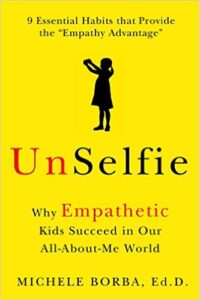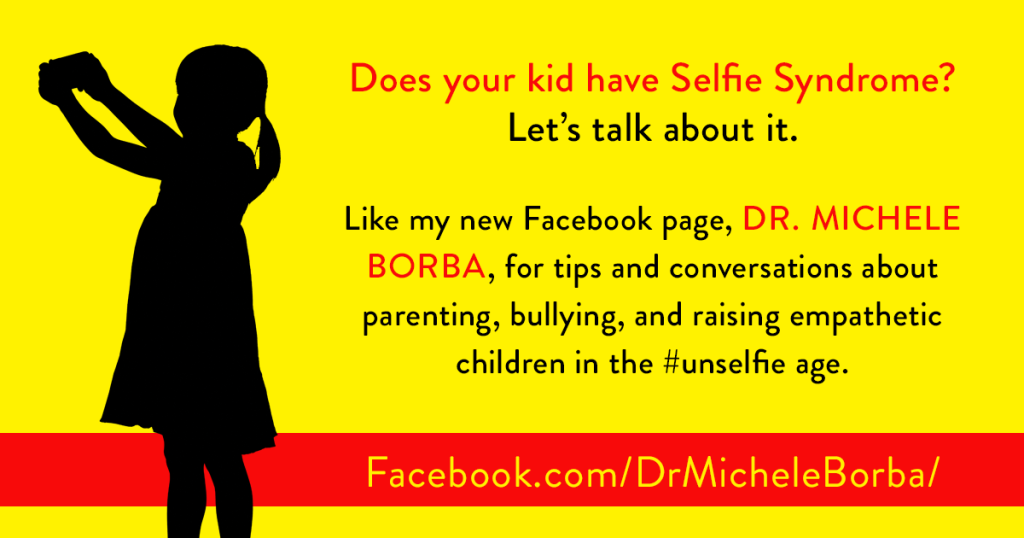Of course we want our kids to be compassionate and sensitive to other people’s feelings. The problem is that many kids’ “empathy potential” is greatly handicapped because they don’t have the ability to identify and express emotions. They have tremendous difficulty feeling for the other person simply because they may not recognize the other person’s hurt, elation, discomfort, anxiety, pride, happiness, or anger.
What these kids need is an education that provides stronger emotional intelligence: an adequate vocabulary of feelings and then the encouragement to use it. Once kids are more emotionally literate and can understand their own feelings their empathy will grow, because they will be far more capable of understanding and feeling other people’s concerns and needs.
We also know that one of the biggest reasons some kids are more sensitive and empathetic is that they can correctly interpret people’s emotional cues: their tone of voice, posture, and facial expressions. Without that emotional understanding, a child is greatly limited in his ability to react to that person’s needs. The good news is that sensitivity can be nurtured in a child.
Here are six proven solutions from my book, UnSelfie: Why Empathetic Kids Succeed in Our All-About-Me World, you can use almost anytime to tune up your child’s awareness of the feelings of others.
1. Praise sensitive, kind actions
One of the simplest and most effective ways of enhancing any behavior is by reinforcing the action as soon as ithappens. So whenever you notice your child acting in a sensitive and caring manner, let her know how pleased it makes you feel:
“Karen, I love how gentle you are with your baby sister. You pat her so softly, and it makes me so happy knowing how caring you are.”
Just make sure it’s deserved. And most important:
Let your child know that the heart is a muscle that can be stretched and grow. When kids are aware that they can become more sensitive, kind and compassionate they are more likely to emulate those types of behaviors.
2. Show the effect of sensitivity
Sensitive, kind acts-even small ones-can make a big difference in people’s lives, so point them out to help your child see the impact his actions made.
“Derrick, your grandmother was so pleased when you called to thank her for the present.”
“Suraya, did you see the smile on Ryan’s face when you shared your toys?”
3. Draw attention to nonverbal feeling cues
Pointing out the facial expressions, posture, and mannerisms of people in different emotional states sensitizes your child to other people’s feelings.
As occasions arise, explain your concern and share what clues helped you make your feeling assessment: “
Did you notice Grandma’s face when you were talking with her today? I thought she looked puzzled. Maybe she is having trouble hearing. Why not talk a little louder when you speak with her?”
“Did you see the expression on Meghan’s face when you were playing today? She looked worried about something because she had a scowl on her face. Maybe you should ask her if everything is OK.”
4. Ask often, “How does he feel?”
One of the easiest ways to nurture your child’s sensitivity is to ask her to ponder how another person feels. As opportunities arise, pose the question often, using situations in books, TV, and movies as well as real life.
“How do you think the mommy feels, knowing that her little girl just won the prize?”
“The tornado destroyed most of the town here in Georgia; see it here on the map? How do you think the people feel?”
“How do you think Daddy feels hearing that his mom is so sick?”
Each question forces your child to stop and think about other people’s concerns, and nurtures sensitivity to their needs.
UnSelfie Tip: If your child has trouble with “How does he or she or they feel then take your question down a level. Start by asking, “How would you feel?” Then gently help stretch your child from ME to WE.
5. Use the formula: “feels + needs”
Michael Schulman and Eva Mekler, authors of Bringing Up a Moral Child, reviewed studies and found that an effective way to increase sensitivity is to ask children questions to help them discover people’s needs and feelings. Such questions were found to expand children’s awareness of what people might be experiencing. As a result the children became more sensitive to how they might be able to help.
To use the idea with your child, look for occasions to draw attention to people’s feelings and then ask her to guess what the person might need in order to remedy the feeling. Here is how a parent might use the method:
Parent: Look at that little girl crying in the sandbox. How do you suppose she feels?
Child: I think she is sad.
Parent: What do you think she needs to make her feel better?
Child: Maybe she could use someone to hug her because she hurt her knee.
6. Share why you feel the way you do
One of the best ways to help kids become sensitive to others’ feelings is to share your own. Use situations as they arise to describe how you feel about them and why:
“I’m so excited! My new computer is being delivered to me today.”
“I am frustrated; yesterday the auto body shop told me that fixing the car would cost five hundred dollars, and now they say it’s going to cost a lot more.”
“I’m so tired. The barking dogs kept me up all night.”
You can find dozens of age by age strategies to nurture sensitive, kindness and empathy in UnSelfie. But remember, the key to successful change is to find one or two solutions that you feel will work best for your child, and then continue to use the same strategy in your daily interactions until you see the change become internalized.
Best!
Michele
 My new book, UNSELFIE: Why Empathetic Kids Succeed in Our All-About-Me World is in print June 2016. (Yahoo!) I’ve spent the last five years researching and writing this book as well as literally flying around the world to find the best ways we can activate our children’s hearts. My goal is to create a conversation that makes us rethink or view of success as exclusively grades, rank and score and includes traits of humanity! It’s filled with common-sense solutions based on the latest science to help us raise compassionate, caring, courageous kids. It’s time to include “empathy” in our parenting and teaching!
My new book, UNSELFIE: Why Empathetic Kids Succeed in Our All-About-Me World is in print June 2016. (Yahoo!) I’ve spent the last five years researching and writing this book as well as literally flying around the world to find the best ways we can activate our children’s hearts. My goal is to create a conversation that makes us rethink or view of success as exclusively grades, rank and score and includes traits of humanity! It’s filled with common-sense solutions based on the latest science to help us raise compassionate, caring, courageous kids. It’s time to include “empathy” in our parenting and teaching!
Dr. Michele Borba, Parenting Expert
You can also refer to my daily blog, Dr. Borba’s Reality Check for late-breaking news and research about child development.
Follow me on twitter @MicheleBorba


